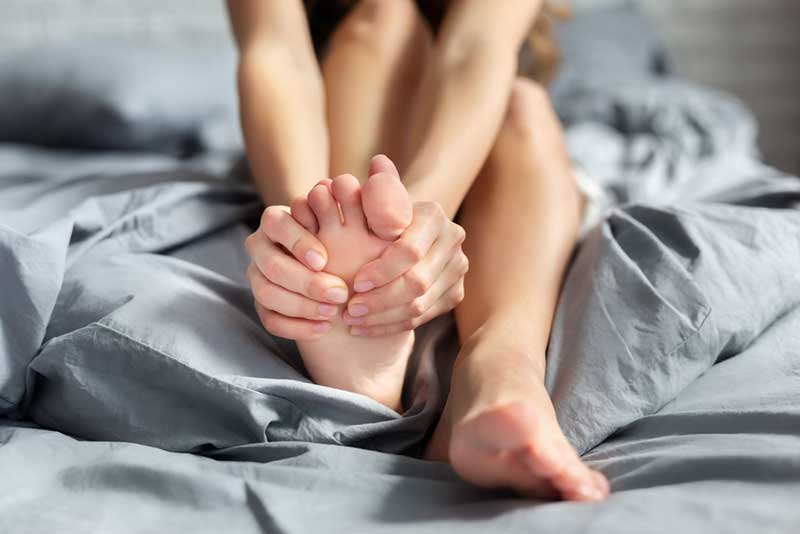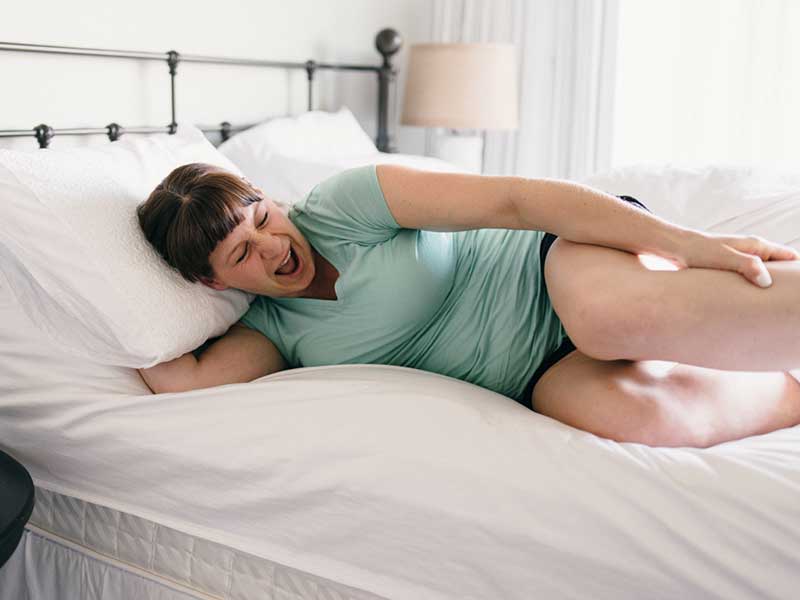Sleep cramps, also known as nocturnal leg cramps, are involuntary muscle contractions that occur during sleep. These painful sensations typically affect the legs and can disrupt a person’s sleep, leading to fatigue and discomfort during the day. Understanding the causes of sleep cramps is essential in managing and preventing this condition. In this article, islasbahamas will explore the various factors that contribute to sleep cramps and discuss effective strategies for relief.
Introduction
Sleep cramps can be a distressing experience, causing sleep disturbances and affecting overall well-being. While they are often harmless, understanding their underlying causes can help individuals find relief and improve their sleep quality. This article aims to shed light on the various factors contributing to sleep cramps and provide practical tips for managing and preventing them.
What Are Sleep Cramps?
Sleep cramps refer to involuntary muscle contractions that occur during sleep. These cramps primarily affect the legs, including the calves, thighs, and feet. They typically manifest as intense pain and can last for a few seconds to several minutes, causing discomfort and disrupting sleep patterns.
The Prevalence of Sleep Cramps
Sleep cramps are a common phenomenon, affecting individuals of all ages and genders. While the exact prevalence is challenging to determine, research suggests that around one in three adults experience sleep cramps at some point in their lives. The frequency and severity of these cramps can vary significantly from person to person.
Common Symptoms and Characteristics
Sleep cramps are characterized by sudden and painful muscle contractions that typically occur during the night. The following symptoms are commonly associated with sleep cramps:
- Intense pain in the affected muscles
- Visible muscle contractions or tightness
- Discomfort or soreness upon awakening
- Temporary inability to move the affected limb
- Tenderness or sensitivity in the affected area

Potential Causes of Sleep Cramps
Understanding the underlying causes of sleep cramps can help individuals identify triggers and implement appropriate preventive measures. While the exact cause may vary from person to person, several factors are commonly associated with sleep cramps:
Dehydration and Electrolyte Imbalances
Dehydration and electrolyte imbalances, such as low levels of potassium, calcium, or magnesium, can increase the likelihood of experiencing sleep cramps. These minerals play a crucial role in muscle function, and their deficiencies can lead to muscle contractions and spasms.
Nutritional Deficiencies
Inadequate intake of certain vitamins and minerals, including vitamin D, B vitamins, and iron, can contribute to sleep cramps. Ensuring a well-balanced diet rich in essential nutrients can help prevent these deficiencies and reduce the occurrence of sleep cramps.
Muscle Fatigue and Overexertion
Engaging in strenuous physical activities or overexerting the muscles can result in sleep cramps. Fatigued muscles are more prone to involuntary contractions during sleep. It is important to balance physical activity and allow for sufficient rest and recovery.
Nerve Compression and Pinched Nerves
Nerve compression or pinched nerves in the spine can cause referred pain and muscle contractions, including during sleep. Conditions such as herniated discs or spinal stenosis can contribute to sleep cramps. Seeking appropriate medical treatment and practicing techniques to alleviate nerve pressure can be beneficial.
Pregnancy and Hormonal Changes
Pregnant women often experience sleep cramps due to hormonal changes and increased pressure on the legs. The growing uterus can compress nerves and blood vessels, leading to muscle cramps during sleep. Gentle stretching exercises and proper prenatal care can help manage sleep cramps during pregnancy.
Medications and Underlying Medical Conditions
Certain medications, such as diuretics and statins, have been associated with an increased risk of sleep cramps. Additionally, underlying medical conditions like diabetes, peripheral artery disease, and kidney disease can contribute to muscle cramps during sleep. Consulting with a healthcare professional to address these conditions is essential.
Lifestyle Factors and Sleep Position
Certain lifestyle factors, such as excessive caffeine intake or wearing restrictive footwear, can contribute to sleep cramps. Moreover, sleeping in an awkward position or keeping the legs in an extended position for an extended period may increase the likelihood of experiencing cramps during sleep.

Managing and Preventing Sleep Cramps
While sleep cramps can be challenging to eliminate entirely, adopting certain strategies can help manage their frequency and intensity. The following tips can be useful in preventing sleep cramps:
Staying Hydrated and Balancing Electrolytes
Ensuring proper hydration and maintaining a balanced intake of electrolytes, such as potassium, calcium, and magnesium, can reduce the likelihood of sleep cramps. Drinking an adequate amount of water throughout the day and consuming foods rich in these minerals can be beneficial.
Maintaining a Healthy Diet and Supplementation
Eating a nutritious diet that includes a variety of fruits, vegetables, whole grains, and lean proteins can help prevent nutritional deficiencies associated with sleep cramps. In some cases, healthcare professionals may recommend supplements to address specific deficiencies.
Stretching and Strengthening Exercises
Regular stretching exercises, particularly focusing on the leg muscles, can improve flexibility and reduce the risk of sleep cramps. Strengthening exercises targeting the muscles surrounding the affected areas can also provide additional support and prevent cramping.
Massage and Heat Therapy
Massaging the affected muscles and applying heat through warm compresses or warm baths can help relax tense muscles and alleviate sleep cramps. These techniques promote blood circulation and relieve muscle tightness.
Adjusting Sleep Position and Environment
Experimenting with different sleep positions and ensuring a comfortable sleep environment can reduce the occurrence of sleep cramps. Elevating the legs with pillows or using a body pillow for added support can alleviate strain on the muscles and improve sleep quality.
When to Seek Medical Attention
While sleep cramps are often harmless and self-limiting, certain circumstances may warrant medical attention. It is advisable to consult a healthcare professional if:
- Sleep cramps are severe, frequent, or persistent
- Cramps are accompanied by swelling, redness, or skin changes
- Sleep cramps interfere significantly with daily activities and sleep quality
- Cramps occur alongside other concerning symptoms
A healthcare provider can assess the underlying causes, provide appropriate treatment, and offer personalized advice for managing sleep cramps.
Conclusion
Sleep cramps can be a distressing condition, affecting the quality of sleep and overall well-being. Understanding the causes of sleep cramps is crucial in implementing effective strategies for prevention and relief. By addressing factors such as dehydration, nutritional deficiencies, muscle fatigue, and underlying medical conditions, individuals can significantly reduce the frequency and intensity of sleep cramps, leading to improved sleep quality and overall comfort.
FAQs
Can stress and anxiety contribute to sleep cramps?
While stress and anxiety can lead to muscle tension and contribute to sleep disturbances, there is no direct evidence linking them to sleep cramps. However, managing stress through relaxation techniques and stress-reducing activities may indirectly help alleviate sleep cramps.
Are there any specific exercises to prevent sleep cramps?
Stretching exercises that target the leg muscles, such as calf stretches and hamstring stretches, can be beneficial in preventing sleep cramps. Additionally, low-impact activities like walking or swimming can help improve overall muscle health.
Can certain medications cause sleep cramps?
Yes, some medications, such as diuretics, statins, and certain asthma medications, have been associated with an increased risk of sleep cramps. If you suspect that your medication may be contributing to sleep cramps, consult with your healthcare provider for possible alternatives or adjustments.
Is there any correlation between age and sleep cramps?
Sleep cramps can affect individuals of all ages, but they tend to be more common among older adults. Factors such as age-related muscle changes, underlying health conditions, and medication use can contribute to the higher prevalence of sleep cramps in this population.
Can sleep cramps be a sign of an underlying medical condition?
While sleep cramps are often benign, they can sometimes be a symptom of an underlying medical condition. Conditions such as peripheral artery disease, diabetes, and neurological disorders can contribute to muscle cramps during sleep. If you have concerns about an underlying condition, consult with a healthcare professional for proper evaluation and diagnosis.

